The Harper government in Canada is about to unveil its new national drug strategy -- it's bad -- and opponents are gathering forces.
Federal prosecutors managed to win another conviction against Ed Rosenthal after he was prevented from mounting a medical marijuana defense, but he won't do another day in jail, and his continuing persecution has sparked a novel form of civil disobedience in the courtroom.
"Beat the Heat: How to Handle Encounters with Law Enforcement" is the best legal self defense book we've seen in some time.
In addition to the weekly reporting you see here in the Chronicle, DRCNet also features daily content in the way of blogging, news links, redistributed press releases and announcements from our allies and more.
Two re-released classics and one new volume by drug reform pioneer Arnold Trebach make up DRCNet's latest premium offer for our members.
Educate and motivate your friends to respectfully assert their rights during police encounters, with these fourth amendment t-shirts from our friends at Flex Your Rights!
Marijuana gone missing from the evidence room, a sheriff pleads guilty, a cop gets arrested for leaking an investigation, and a trooper gets oral sex, but loses his job. Just another week of prohibition-related police misbehavior.
The Minnesota Supreme Court has upheld the use of drug dogs to sniff the exterior of residences based on the "articulable suspicion" -- not the higher level of proof required by probable cause.
Police need a search warrant to peruse the contents of a cell phone, even if its owner has been arrested or is being booked, a federal court in San Francisco held.
Even the Bush administration wanted to get rid of the federal grant program that funds multi-agency drug task forces at the state and local level. But spurred by powerful law enforcement interests, the Senate has voted to restore funding.
A bill making Rhode Island's medical marijuana law permanent has passed both houses of the legislature with veto-proof majorities. Although Gov. Donald Carcieri is threatening a veto, it doesn't appear he will be able to stop it.
The Southeast Asian version of the drug war keeps producing more death sentences, with nine handed out Tuesday in Indonesia and seven more the same day in Vietnam.
The screws are tightening on Holland's famous cannabis coffee shops. Rotterdam is cutting their number by nearly half, while Maastricht coffee shop owners are instituting a fingerprinting and ID scan scheme to try to avoid the heat.
Multimedia by two major newspapers of two good friends of the organization.
Events and quotes of note from this week's drug policy events of years past.
Support the cause by featuring automatically-updating Drug War Chronicle and other DRCNet content links on your web site!
A new way for you to receive DRCNet articles -- Drug War Chronicle and more -- is now available.
Visit our new web site each day to see a running countdown to the events coming up the soonest, and more.
The Conservative government of Canadian Prime Minister Steven Harper is set to reveal what is expected to be a US-style approach to drug policy any day now. While action in parliament is unlikely until after the looming summer recess, battle lines are already being drawn in what promises to be a bitter fight.
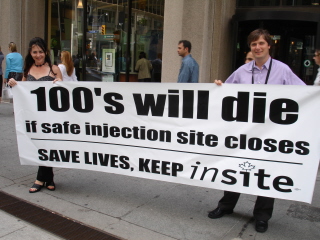
pro-Insite demonstrators (photo courtesy timetodeliver.org)
Although the government has yet to reveal particulars, it is widely assumed that the new drug strategy will take a "tough on crime" approach to drugs, cracking down on grow-ops and drug sellers with harsher penalties, providing more money for law enforcement, and moving away from harm reduction approaches such as Vancouver's
Insite safe injection site.
"There will be a heavier emphasis on enforcement, with some additional money for treatment," said Eugene Oscapella, head of the Canadian Drug Policy Foundation. "The other thing is they want mandatory minimum sentences for some drug offenses, especially serious trafficking offenses," he told Drug War Chronicle.
An early hint of the Harper government's drug policy came in March, when Conservatives allocated an extra $70 million over two years for enforcement, treatment, and prevention, but no mention was made of harm reduction programs. In Canada, these also include needle exchanges and the distribution of sterile crack pipes.
Of the additional funding, treatment programs will get nearly half, law enforcement about a third, and the rest will go into "just say no" style youth prevention program. The new drug strategy is also expected to endorse the use of drug courts, where drug offenders can be ordered into treatment programs instead of jail or prison.
The Canadian federal government currently spends about $350 million a year on anti-drug efforts, the vast majority of which goes to law enforcement, with lesser amounts for treatment and prevention, and a pittance for harm reduction. Canadian drug policy is guided by a 20-year-old national drug strategy that has been widely criticized for lacking clear direction, targets, and measurable results.
What the Harper government is proposing is not the answer, says a growing chorus of critics. The Liberal Party was quick off the mark to attack the yet-to-be-seen Conservative drug strategy.
"Stephen Harper's government is expected to announce next week new measures that will retreat from harm reduction measures that help Canadians, such as the safe injection site in Vancouver," said Liberal Health critic Bonnie Brown in a press release last week. "They are trying to do this under the guise of cracking down on illicit drug trafficking and prevention -- even though all the research suggests that an ideologically-motivated war on drugs is ineffective, while programs such as the safe injection site are producing positive results."
A series of reports -- including the Canadian Medical Association Journal and the BC Centre for Excellence in HIV/AIDS -- have concluded that the site has had a positive effect on Vancouver's Downtown Eastside, and has not increased crime or addiction rates, or threatened public health and safety.
"Rather than focusing its efforts where they are needed most -- such as funding the safe injection site and other programs vital to a larger harm reduction strategy in Canada -- this government is putting its right-wing agenda ahead of scientific evidence, and at a tremendous cost to those affected by addiction," said Brown.
Brown's charge resonates with a number of Canadian researchers. "The science is there. What we're seeing here is political interference," said Dr. Thomas Kerr with the BC Centre for Excellence in HIV/AIDS, who has led several research studies on Insite. "I think it's a sad day for drug policy in Canada given that the Conservative government is now advocating a US-style approach to drug policy that's been shown to fail," he told reporters in Vancouver last week.
Kerr isn't the only one complaining. Several prominent researchers from across Canada have written an open letter to Health Canada criticizing it for calling for new research on Insite despite years of research showing positive incomes. The call for proposals from Health Canada ensures that the research will be superficial and inadequately funded, they said. They also took issue with a condition that researchers not be allowed to talk about their findings for six months after reports are submitted.
"Clearly what that does is to muffle people who might have something to say until after the curtain has dropped on this piece of political theatre," Benedikt Fischer, a director of the BC Centre for Addictions Research at the University of Victoria, said in an interview last Friday. "Overall, we get the feeling that what this is about is there's an attempt to instrumentalize science in a fairly cheap way for politics."
"The Conservatives don't like InSite," said Oscapella. "This is not an issue of science, but of ideology and playing to the peanut gallery. They have tried to misstate its purpose, what it has achieved, and the position of other countries. This is a propaganda exercise by the government to further its electoral objectives," he said.
"But the Liberals are no angels, either," he pointed out. "They had three opportunities to reform the cannabis laws and they didn't do that. I give them some credit for the medical marijuana regulations, but at the same time, the process is now incredibly cumbersome. They backed away from decriminalization. In effect, they backed a tough drug war, but with softer rhetoric."
"The Liberals are known to oppose from the left and govern from the right," said Dana Larsen, a New Democratic Party (NDP) candidate for a West Vancouver riding and head of the party's anti-prohibitionist wing, eNDProhibition. "Now they're in opposition, and they will say that Harper's drug war is wrong. But they passed our current drug law in 1996 despite testimony from nearly everyone it was bad law, and marijuana arrests went up every year the Liberals were in power."
But while the national NDP supports harm reduction and legalizing marijuana as part of its platform, its national leadership has not embraced the issue, Larsen said. "The party is good on policy, and the party spokesperson on drug issues, Libby Davies, is great, but we haven't succeeded yet in getting the party to make ending the drug war a priority."
Davies was traveling on personal business outside the country and unavailable for comment this week.
Canada will have all summer to brood over the coming battles over drugs and crime, but with the Harper government a minority government, it will have to reach out to the Liberals, the NDP, or the Bloc Quebecois to pass anything. None of the opposition parties seems likely to support a "tough on drugs" package like that now envisioned by the Conservatives.
"They don't have the votes to pass this by themselves," said Oscapella. "The fear is what happens if they get reelected with a majority. Then they could walk all over everybody."
back to top
A federal jury Wednesday found "Guru of Ganja" Ed Rosenthal guilty for a second time of growing hundreds of marijuana plants in what is no more than a symbolic victory for federal prosecutors. Because Rosenthal has already served a lenient one-day sentence after he was first convicted of the same charges in 2003, US District Court Judge Charles Breyer, the presiding judge in the case, has already ruled that he cannot be resentenced.

Ed Rosenthal at courthouse, with supporters, September 2006 (courtesy indybay.org)
Rosenthal's original conviction was overturned on appeal. Vengeful federal prosecutors angered by his public criticism of their methods retried him knowing they could not further punish him. They even filed additional charges that Judge Breyer threw out as vindictive.
The trial itself was noteworthy for the mass refusal of medical marijuana movement people subpoenaed to testify for the government to do so. Equally noteworthy was their escaping without contempt citations -- at least so far.
Rosenthal grew the plants to produce medical marijuana for use in California, where it is legal, but his defense was unable to explain that to the jury because it was blocked from doing so by Judge Breyer. Federal law and the federal courts do not recognize "medical" marijuana. Neither was Breyer willing to let defense attorneys go too far in urging the jury to vote its conscience.
"There are places that we can't go... There are answers too realistic, reasonable questions you may have that I can't give you," defense attorney Robert Ampranan told the jurors during final arguments. "I fear my government because it does not always tell us the truth. The federal government has had almost six years to complete this recipe... and yet their recipe, ladies and gentlemen, contains tainted, soiled, spoiled ingredients," he said. "If it smells like something that's going to make you sick, you have the right to reject it."
Shortly later, as Amparan compared Rosenthal's prosecution to past injustices done under color of law, such as slavery and the internment of Japanese-Americans during World War II, Breyer sent the jury from the courtroom and accused Amparan of trying to lead the jury into questioning the federal law itself. When Amparan replied that he wasn't, but that he intended to cite the false pretenses for the war in Iraq and the disastrous response to Hurricane Katrina as other examples of government mistakes, the packed courtroom burst into cheers. Breyer warned that he would clear the courtroom if any more outbursts occurred, then ordered Amparan not to make that argument to the jury.
After deliberating for two days, the jury convicted Rosenthal of growing more than 100 marijuana plants, conspiring to cultivate the drug and maintaining a growing operation in a warehouse. He was acquitted of a fourth charge, and Breyer sternly ordered prosecutors to drop the fifth charge when the jury said it was deadlocked.
"It's a shame that the federal government continues to put California citizens in the position of having to set aside their own votes at the ballot box and pretend they don't know anything about the state law or medical science," said William Dolphin, a spokesman for the Rosenthal defense fund Green Aid. "After 60% of the jury pool just refused to be involved in a case like this, we ended up with a jury that felt like it had to follow the instructions of the court."
"The government has shown it can in fact win a conviction in a medical marijuana case in the most pot-sympathetic district in the country," said Dale Gieringer, head of California NORML. "Of course, when we have to play by their rules and can't even mention the main element of the defense, it's an open and shut case. Ed was clearly growing pot, as was shown by the government."
If the verdict was somewhat anticlimactic, there was high drama and civil disobedience in court last Friday. That's when six medical marijuana movement witnesses subpoenaed by the government to testify against Rosenthal simply refused. Five others who were prepared to join them were dismissed on technical grounds.
One by one, recalcitrant witnesses Debbie Goldsberry, James Blair, Etienne Fontan, Evan Schwartz, Brian Lundeen, and Cory Okie told the court they would not participate in an immoral prosecution. (Read the transcript here.) "I told them I could not participate and go against the wishes of the community," said Goldsberry.
Judge Breyer praised the six for their dignified conduct and asked them if being sent to jail for the weekend would make them change their minds about testifying. When they replied in the negative, he sent them home for the weekend. They reappeared on Tuesday, reiterated their refusal to testify, and Breyer simply excused them.
The successful act of civil disobedience merits attention, said California NORML's Gieringer. "It's important that this gets some attention because it is one of the few actions where people have had the courage to risk going to jail for refusing to testify for the government," said Gieringer. "The prosecutor can file contempt charges if he wants, but I think the judge would be pretty unhappy. Rosenthal isn't going to jail in any case, so to have someone go to jail would be a real travesty."
"The community is getting fed up," said Green Aid's Dolphin. "The jury pool was not happy, the judge was not happy, and a dozen people subpoenaed to testify just said 'I'm not going to do it, and you can't make me.'"
The federal government prevailed by winning several convictions against Rosenthal, but the victory may be a pyrrhic one. The Justice Department and local federal prosecutors have managed to irritate just about everybody in Northern California, from the presiding judge on down. And the continuing persecution of Rosenthal and other medical marijuana providers has only strengthened the community and emboldened it to try new, provocative tactics.
back to top
As our latest membership premium, DRCNet is now offering: "Beat the Heat: How to Handle Encounters with Law Enforcement." Though not hot-off-the-press, this 2003 publication by attorney Katya Komisaruk is, according to Drug War Chronicle editor Phillip S. Smith, "the best legal self defense book we've seen in some time." It's sad that such a book would be so desperately needed, but in this nation with drastically eroded constitutional rights and draconian mandatory minimum sentences for minor drug offenders, "Beat the Heat" provides an important public service. Donate $32 or more to DRCNet, and you can receive a complimentary copy of "Beat the Heat" as our thanks.
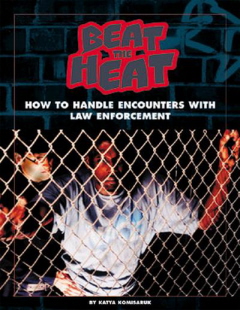 According to Phil:
According to Phil:
"A valuable portion of 'Beat the Heat' is devoted to explaining just how police get people to waive their rights -- intimidation, false friendliness, lies -- and how to avoid falling into those traps... It's also a primer for those who have been arrested... Komarisuk covers it all, from getting out on bail to working with your lawyer to what to do if all else has failed and you're headed for prison. There's also a chapter on how to witness and accurately report police misconduct, as well as chapters on the legal rights of minors and non-citizens."
While it's sad that such a book would be needed, in this nation with curtailed constitutional liberties, mandatory minimum sentencing for first-time drug offenders and record incarceration rates, it is.
We continue to offer the similarly-spirited Flex Your Rights "Got a Warrant?" and "I Don't Consent to Searches" 4th amendment t-shirts (donate $30 or more) and DVD "BUSTED: The Citizen's Guide to Surviving Police Encounters" (donate $25 or more), and many other premiums that are listed on our donation web page -- subtract $5 from the cost of the t-shirts or Busted to add them to your book order -- visit http://stopthedrugwar.org/donate to donate today. (Use the comment box at the bottom of the page to indicate any multiple or special orders that don't appear in the gift selection drop-down menu.)
Your donation will help DRCNet as we advance what we think is an incredible two-year plan to substantially advance drug policy reform and the cause of ending prohibition globally and in the US. Please make a generous donation today to help the cause! I know you will feel the money was well spent after you see what DRCNet has in store. Our online donation form lets you donate by credit card, by PayPal, or to print out a form to send with your check or money order by mail.
Please note that contributions to the Drug Reform Coordination Network, our lobbying entity, are not tax-deductible. Tax-deductible donations can be made to DRCNet Foundation, our educational wing. (Choosing one or more gifts will reduce the portion of your donation that you can deduct by the retail cost of the item.) Both groups receive member mail at: DRCNet, P.O. Box 18402, Washington, DC 20036.
Thank you for your support, and hope to hear from you soon.
Sincerely,

David Borden
Executive Director
back to top
Along with our weekly in-depth Chronicle reporting, DRCNet has since late summer also been providing daily content in the way of blogging in the Stop the Drug War Speakeasy, as well as Latest News links (upper right-hand corner of most web pages), event listings (lower right-hand corner) and other info. Check out DRCNet every day to stay on top of the drug reform game!
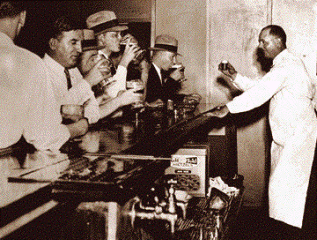
Speakeasy photo (courtesy arbizu.org)
This week:
Scott Morgan opines on: "David in the Liar's Den," "Ed Rosenthal Convicted of Following State Law, Helping Sick People," "Testing Positive for Marijuana Doesn't Mean You're High" and "Why Does DEA Teach Meth-Cooking to the Public?"
Phil Smith reports: "A New Activist's Tactic Emerges in the Rosenthal Trial" and asks that you "Ponder This Graph for a Moment, Please."
David Guard has been busy too, posting a plethora of press releases, action alerts, job listings and other interesting items reposted from many allied organizations around the world in our "In the Trenches" activist feed. And over in the DRCNet's Reader Blogs we have "Scared Tolerant," "Wo/Men's Alliance for Medical Marijuana Federal Law Suit" and "The D.A."
Thanks for reading, and writing...
back to top
Update to original offer: Trebach has agreed to sign all copies of his books that you get from DRCNet! Also, add just $22 or more to your donation to get a copy of Lies, Damn Lies, and Drug War Statistics too! (Make a note in the comment box to let us know you're requesting this.)
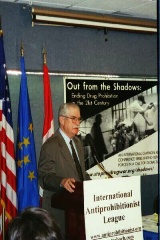
Arnold Trebach at 2003 press conference on which DRCNet collaborated
We are pleased to announce that our latest premium book offer for members is the "Trebach Trilogy" -- two re-released classics by Arnold Trebach -- a long-time friend of DRCNet, founder of the Drug Policy Foundation and known to reform cognoscenti as the father of the modern drug policy reform movement -- and one newly-minted volume:
- The Heroin Solution: "A blockbuster," says Publishers Weekly. "Eloquent and persuasive," according to The New York Times.
- The Great Drug War, and Rational Proposals to Turn the Tide: Two decades ago, in what was a heartfelt indictment of the Reagan-era war on drugs, Trebach identified and brought to vivid life all sorts of abuses derived from the effort to enforce drug prohibition and began to elaborate a strategy for escaping from drug war and achieving "drug peace." (Drug War Chronicle)
- Fatal Distraction: The War on Drugs in the Age of Islamic Terror: [T]he distillation of a life's work in the trenches of drug law reform... a book grizzled reformers and bright-eyed newcomers to the cause alike will want to read and absorb. (Drug War Chronicle)
Please help DRCNet's work with a generous donation. If your donation is $35 or more, we'll send you a complimentary copy of any one of the Trebach books -- or donate $65 or more and choose two, or $90 or more for all three.
Your donation will help DRCNet as we advance what we think is an incredible two-year plan to substantially advance drug policy reform and the cause of ending prohibition globally and in the US. Please make a generous donation today to help the cause! I know you will feel the money was well spent after you see what DRCNet has in store. Our online donation form lets you donate by credit card, by PayPal, or to print out a form to send with your check or money order by mail. Please note that contributions to the Drug Reform Coordination Network, our lobbying entity, are not tax-deductible. Tax-deductible donations can be made to DRCNet Foundation, our educational wing. (Choosing gift items will reduce the portion of your donation that you can deduct by the retail cost of the item.) Both groups receive member mail at: DRCNet, P.O. Box 18402, Washington, DC 20036.
Read Chronicle editor Phil Smith's review of The Great Drug War here, Phil's review of Fatal Distraction here, and Phil's review of The Heroin Solution here.

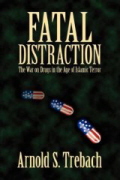
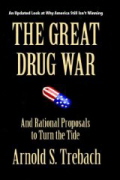
back to top
 As our latest membership premium, DRCNet is pleased to offer t-shirts from our friends at the group Flex Your Rights -- white t-shirts reading "I Don't Consent to Searches" and black t-shirts reading "Got a Warrant?," both with the text of the 4th amendment on the back. Flex Your Rights is the maker of a video that more than 800 DRCNet subscribers have bought from us, "Busted: The Citizen's Guide to Surviving Police Encounters." I wear Flex Your Rights shirts all the time, and they've gotten me into many conversations, but never into trouble.
As our latest membership premium, DRCNet is pleased to offer t-shirts from our friends at the group Flex Your Rights -- white t-shirts reading "I Don't Consent to Searches" and black t-shirts reading "Got a Warrant?," both with the text of the 4th amendment on the back. Flex Your Rights is the maker of a video that more than 800 DRCNet subscribers have bought from us, "Busted: The Citizen's Guide to Surviving Police Encounters." I wear Flex Your Rights shirts all the time, and they've gotten me into many conversations, but never into trouble.
Donate $30 or more to DRCNet take your pick of the two shirts -- donate $55 or more to get both! Donate $50 and we'll send you a shirt AND a copy of Busted -- or $75 to order Busted and both shirts!
 We also continue all our other recent offers -- "Lies, Damn Lies, and Drug War Statistics," the three Arnold Trebach books, StoptheDrugwar.org merchandise, many more. Visit our donation page online to view all the offerings in the right-hand column.
We also continue all our other recent offers -- "Lies, Damn Lies, and Drug War Statistics," the three Arnold Trebach books, StoptheDrugwar.org merchandise, many more. Visit our donation page online to view all the offerings in the right-hand column.
Your donation will help DRCNet as we advance what we think is an incredible two-year plan to substantially advance drug policy reform and the cause of ending prohibition globally and in the US. Please make a generous donation today to help the cause! I know you will feel the money was well spent after you see what DRCNet has in store. Our online donation form lets you donate by credit card, by PayPal, or to print out a form to send with your check or money order by mail.
 Please note that contributions to the Drug Reform Coordination Network, our lobbying entity, are not tax-deductible. Tax-deductible donations can be made to DRCNet Foundation, our educational wing. (Choosing one or more gifts will reduce the portion of your donation that you can deduct by the retail cost of the item.) Both groups receive member mail at: DRCNet, P.O. Box 18402, Washington, DC 20036.
Please note that contributions to the Drug Reform Coordination Network, our lobbying entity, are not tax-deductible. Tax-deductible donations can be made to DRCNet Foundation, our educational wing. (Choosing one or more gifts will reduce the portion of your donation that you can deduct by the retail cost of the item.) Both groups receive member mail at: DRCNet, P.O. Box 18402, Washington, DC 20036.
Thank you for your support, and hope to hear from you soon.
Sincerely,

David Borden
Executive Director
back to top
Marijuana gone missing from the evidence room, a sheriff pleads guilty, a cop gets arrested for leaking an investigation, and a trooper gets oral sex but loses his job. Just another week of prohibition-related police misbehavior. Let's get to it:
In Nashville, a Tennessee state trooper has been fired for dropping a drug charge against a porn actress in exchange for oral sex. Trooper James Randy Moss was fired May 25 over the May 7 incident, which began when he pulled over 21-year-old Justis Richert, known professionally as Barbie Cummings. According to a citation issued by Moss, he pulled her over for speeding. But in a post on her blog that has since disappeared -- but not before someone reported it to police -- Cummings wrote that Moss discovered her illegal prescription drugs, she told him she was a porn star, they adjourned to his vehicle where they looked up web sites featuring her performing, he threw away the pills, and she provided him with oral sex. Moss faces possible charges for destroying the drug evidence as well.
In Richmond, Virginia, the former Henry County sheriff pleaded guilty May 24 to lying to authorities about widespread corruption in his department. Former Sheriff H. Franklin Cassell and 12 current or former deputies, as well as seven other people, were indicted last fall on charges they sold guns and drugs they had seized. All but three have pleaded guilty to charges including racketeering conspiracy, narcotics distribution, and weapons counts in a conspiracy that lasted from 1998 until last fall's arrests. Cassell was not charged with participating in the conspiracy, but with ignoring it and lying to federal investigators about it. He pleaded guilty to making false statements and is expected to serve six to 12 months in federal prison.
In Fort Sumner, Texas, marijuana has gone missing from the police department evidence room. Chief Wayne Atchley reported that he spotted a trail of dried marijuana leaves leading out of the evidence room on May 10, and that an unknown portion of a 2,500-plant seizure was missing. There were no signs of forced entry, suggesting it could have been an inside job. It is unclear how many people had keys to the building. Atchley added that it appeared the thieves knew the marijuana was there because it was the only thing taken. He has asked the Texas Department of Public Safety to investigate.
In Hollywood, Florida, a fifth city police officer has been arrested in Operation Tarnished shield. Lt. Chuck Roberts, a 23-year veteran, was arrested at his home May 24 on charges he leaked word of the investigation, which has so far resulted in the guilty pleas of four other Hollywood officers on drug conspiracy charges for offering their services to protect drug shipments in an FBI undercover sting. According to an FBI affidavit, Roberts was told of the sting by a senior commander. He then told another officer, who told one of the officers being investigated, thus bringing the operation to a premature end. Roberts then allegedly lied to the FBI about it. He was charged with making false statements to the FBI. Roberts and two other officers were suspended two weeks ago because of their links to the leaks, but the other two have not been charged.
back to top
The Minnesota Supreme Court ruled May 24 that police need only articulable suspicion -- not the higher standard of probable cause -- to be able to use a drug sniffing dog to sniff the outside door of a person's residence. The 5-2 decision sparked a bitter dissent.

drug dog
The ruling came in
Minnesota v. Davis, in which Burnsville police were informed by maintenance workers in an apartment complex that they thought they saw marijuana grow lights and that Evans would not let them in the apartment to fix a water leak. Based on that information, police brought a drug dog to the location, and the dog reacted outside the apartment door. Police then used the maintenance workers' information, the drug dog alert, and Davis's past criminal record to obtain a search warrant, which resulted in the finding of various items of contraband and three drug charges against Davis.
At trial, Davis moved to suppress the evidence, arguing that police needed probable cause to sic a drug dog on his apartment door because the drug dog sniff of his door exterior actually amounted to a "search" of his apartment, thus requiring probable cause. He lost at the trial court, which concluded that police needed only articulable suspicion and had met that standard. The Minnesota Court of Appeals affirmed that decision, and now the state Supreme Court has reaffirmed it.
While the state constitution requires the courts to balance individuals' privacy interest against the public interest in effective law enforcement, the state Supreme Court held that the intrusion into Davis's privacy was so minimal as to not require the higher standard of probable cause. The only intrusion into Davis's privacy occurred because the dog could sniff what the public could not. "This intrusion, however, is minimal," Justice Gildea wrote for the majority.
"When we balance the minimal intrusion on [the defendant's] privacy interests inside his residence against the governmental interest in the use of narcotics-detection dogs as an investigative tool to combat drug crime, we conclude that the police needed a reasonable, articulable suspicion to walk a narcotics-detection dog down the common hallway outside [the defendant's] apartment," Gildea wrote. The report from maintenance workers rose to the level of articulable suspicion, the opinion added.
Justice Alan Page, joined by Justice Helen Meyer, strongly dissented from the majority's opinion. "This case marks a significant departure from our constitutional jurisprudence because it is the first time the court has authorized the search of a private residence based on anything less than probable cause in the absence of exigent circumstances," Page wrote. "It is a departure that takes us down a road that erodes Fourth Amendment protections in one's home. That is a road I am unwilling to go down." Unfortunately, Page was in the minority.
back to top
A federal district court judge in Northern California ruled May 23 that police need a search warrant to peruse the contents of cell phones seized from people being arrested. While police may typically search people at the time of arrest and at booking, the judge held that searching a cell phone requires a search warrant.
The case arose from a December 2004 medical marijuana dispensary raid by the San Francisco Police Department in which five people were arrested. Three of them--Edward Park, Brian Ly and David Lee -- were taken to a local police station, where SFPD Police Inspector David Martinovich admitted searching one man's phone and ordering another police inspector to search the other two men's phones.
"I believed that a search of the cellular telephones at the police station during the booking process was permissible as a booking search," Martinovich said in court documents. He admitted perusing the cell phone and writing down the contents of its address book.
The three men filed a motion to suppress the evidence, saying the warrantless cell phone search violated the Fourth Amendment. US District Judge Susan Illston agreed.
"This court finds... that for purposes of Fourth Amendment analysis, cellular phones should be considered 'possessions within an arrestee's immediate control' and not part of 'the person,'" wrote Illston in her opinion. "This is so because modern cellular phones have the capacity for storing immense amounts of private information."
Illston expressed concern at violations of people's right to privacy. "Unlike pagers or address books, modern cell phones record incoming and outgoing calls, and can also contain address books, calendars, voice and text messages, e-mail, video and pictures. Individuals can store highly personal information on their cell phones, and can record their most private thoughts and conversations on their cell phones through e-mail and text, voice and instant messages," she noted.
"Any contrary holding could have far-ranging consequences," Illston continued. "At the hearing, the government asserted that, although the officers here limited their searches to the phones' address books, the officers could have searched any information -- such as e-mails or messages -- stored in the cell phones."
The government failed to show any purpose other than furthering criminal investigations, Illston concluded. "The court finds that the government has not met its burden to show, by a preponderance of the evidence, that it is standard police practice to search the contents of a cellular phone as part of the booking process," she wrote. "Indeed, the government has not articulated any reason why it is necessary to search the contents of a cell phone in order to fulfill any of the legitimate governmental interests served by a booking search: namely, to deter theft of arrestees' property and false claims of theft by arrestees, and to identify contraband and other items."
As Illston noted in her opinion, there is no controlling opinion on these issues in either the 9th US Court of Appeals or the US Supreme Court. In one similar federal case, the presiding judge found for the government. These issues are likely to be further adjudicated in the federal appeals courts.
back to top
The US Senate voted last Friday to approve legislation that will restore the Edward Byrne Justice Assistance Grant (JAG) program, which supplies funding to state and local law enforcement that allows those agencies to create multi-agency drug task forces. The legislation would reauthorize the Byrne/JAG grants for another five years at their 2006 funding level of about $200 million a year.
The program has been harshly criticized not only by those who cite numerous drug task force abuses, but also by those critical of wasteful, inefficient programs. Two years ago, the taxpayer group Citizens Against Government Waste issued a scathing report on wasteful drug policy spending. "Designed chiefly to curb drug trafficking across America's borders, the program has become a drug prevention funding free-for-all for power-hungry politicians to bring home the bacon to their districts at the taxpayers' expense, and has decreased drug enforcement in areas where it is critically needed," the group found.
The Bush administration has been trying to eliminate the Byrne/JAG grant program as a cost-saving measure, but the powerful law enforcement lobby screamed bloody murder. The move to restore funding was endorsed by the International Association of Chiefs of Police, the National Sheriff's Association, the National Association of Police Organizations, the National Narcotic Officers' Associations' Coalition, the National District Attorneys' Association, the National Criminal Justice Association, the State Association of Addiction Services, rhe National Policy Legal Action Center, the National Association of Counties, the National Alliance of State Drug Enforcement Agencies, the Major City Chiefs Association, the Major County Sheriffs Association, the National Association of State Alcohol and Drug Abuse Directors, the National HIDTA Directors Association, and the National Troopers Coalition.
Supporters of the drug task force grants led by Sens. Diane Feinstein (D-CA) and Saxby Chambliss (R-GA) managed to round up 51 co-sponsors to the bill. Cops and politicians alike were crowing about their victory after the vote.
"The Senate has approved legislation to reauthorize the Byrne/JAG grants for five additional years. At a time when this country is seeing the biggest surge in violent crime it has experienced in more than a decade, we must fund programs like Byrne/JAG," Sen. Feinstein said. "These grants are critical to supporting multi-jurisdictional task forces in their fight against drug and firearm traffickers, gangs, and organized crime. The Byrne/JAG program has shown real results for more than two decades, and these funds will allow the successes to continue."
"I have heard first-hand from Georgia's law enforcement community that this funding is critical to their efforts in fighting crime and drugs and keeping our citizens in both rural and urban communities safe," said Sen. Chambliss. "If we're going to call upon folks to do more, then we have to provide the resources they need to carry out their duties. Planning for and providing robust funding for this effective program is essential to the folks we rely on to keep us and our families safe."
"The National Sheriffs' Association would like to thank Senator Feinstein for her continued leadership to combat gangs and her tireless efforts to ensure that this vital law enforcement program is revitalized," said National Sheriffs' Association President Ted Kamatchus, of Marshall County, Iowa.
"The IACP applauds the Senate's passage of the Edward Byrne Memorial Justice Assistance Reauthorization (Byrne-JAG)," said Chief Joseph C. Carter, Chief of the MBTA Transit Police and President of the International Association of Chiefs of Police (IACP). "This measure would help law enforcement agencies fight against drug abuse, crime, and violence, and it would improve the criminal justice system. The Byrne-JAG Program has consistently provided valuable and critical resources to state, tribal, and local law enforcement agencies, and the IACP urges the House of Representatives to approve this legislation."
"The National Narcotic Officers' Associations' Coalition, representing the interests of nearly 70,000 narcotic officers in 43 states across the country, would like to thank Senator Feinstein and the fifty-two co-sponsors of S.231 for recognizing the importance of extending the current authorization of the Edward Byrne Justice Assistance Grant program. This program's reauthorization will provide resources that are vital to America's narcotic officers - helping them keep neighborhoods safe from the increasing threat of gangs and drugs in America's communities," National Narcotic Officers' Associations' Coalition President Ron Brooks.
Now it's on to the House, where it will likely be equally difficult to stop the law enforcement juggernaut.
back to top
Only one man now stands between Rhode Islanders and a permanent medical marijuana law, and even he isn't going to be able to stop it. On Wednesday, the state Senate voted overwhelmingly for the bill. Last week, the state House passed it by a similar margin.
Gov. Donald Carcieri (R) has vowed to veto the bill. But with both houses passing the bill with more than 80% of the vote, the bill's legislative supporters should have no problem in securing the two-thirds vote needed to override the expected veto.
It wouldn't be the first time. In 2005, Gov. Carcieri vetoed a medical marijuana bill that is scheduled to sunset June 30, but in January 2006 the legislature overrode that veto -- the only time that any state legislature has overridden a veto in order to legalize medical marijuana.
The Edward O. Hawkins and Thomas C. Slater Medical Marijuana Act would "protect patients with debilitating medical conditions, and their physicians and primary caregivers, from arrest and prosecution, criminal and other penalties, and property forfeiture if such patients engage in the medical use of marijuana."
Under the bill, patients need a doctor's recommendation and a registry card from the state Department of Health. They and their registered primary caregivers can possess up to 12 plants and 2.5 ounces of usable marijuana.
The bill won broad support in the legislature thanks in part to the efforts of the Rhode Island Patients Advocacy Coalition, an umbrella group uniting patients, medical professionals and organizations, advocates, and just plain citizens who support legal access to medical marijuana.
back to top
Southeast Asia continues its macabre response to drug trafficking and manufacturing, with nine people being sentenced to death in Indonesia this week for manufacturing ecstasy and three more sentenced to death in Vietnam for manufacturing and trafficking in methamphetamines. Another four people were sentenced to death for heroin trafficking in Vietnam the same day. The region, along with China, is responsible for most drug offense death sentences.

Chinese anti-drug poster
In Indonesia, the Indonesian Supreme Court Tuesday pronounced death sentences on a French man, a Dutch man, two Indonesians, and five Chinese men. The Europeans were the manufacturing experts, the Indonesians ran day-to-day manufacturing, and the Chinese funded the whole venture, which produced millions of ecstasy tablets.
"The Supreme Court considers the Frenchman and Dutchman experts," said Justice Djoko Sarwoko. "If we let them be, they would be able to produce in other place, or teach others their skills. This is a threat to the next generation." [Ed: The judge's statement is Orwellian -- even if one were to agree that the defendants should be prevented from manufacturing drugs in the future, that could be accomplished by methods other than execution.]
That same day, the People's Court of Ho Chi Minh City pronounced death sentences on three men and a woman for buying methamphetamine powder in neighboring Cambodia, pressing it into pills of various colors and shapes, and selling them to customers in the city. One other man was sentenced to life in prison, while 17 other codefendants were sentenced to prison terms ranging from five to 18 years.
"They produced and sold 24,000 pills weighing up to 6 kilograms in the period between 2003 and March 2005, when the ring was busted," said presiding Judge Vu Phi Long said. "This is one of the largest non-heroin drug cases so far."
Meanwhile, in the People's Court of Son La province imposed the death sentence Tuesday on three men for trafficking in less than 35 pounds of heroin. A woman in the case was sentenced to life in prison.
Under Vietnamese sentencing guidelines, possession, distributing, manufacturing, or smuggling more than 600 grams (approximately 1.25 pounds) of heroin or 2500 grams (a little more than five pounds) of synthetic drugs is punishable by death. Vietnam has now sentenced 22 drug offenders to death this year.
Vietnam and the nine other member countries of the Association of Southeast Asian Nations (Brunei Darussalam, Cambodia, Indonesia, Malaysia, Myanmar, Philippines, Singapore, Thailand) have vowed to create a drug-free region by 2015.
back to top
The Dutch government's tougher line on Holland's famous marijuana coffee shops is taking a toll. In Rotterdam, nearly half of the city's coffee shops will have to shut down because they are too near to secondary schools. Meanwhile, in the border city of Maastricht, where "drug tourists" from neighboring countries with more repressive pot laws flood into town to score, the local coffee shop association announced this week it will begin requiring fingerprint scans of all customers.
Holland currently has more than 700 coffee shops, down substantially from a peak of around 1,500. The coffee shops are much criticized by Holland's neighbors, and the current Dutch government would like to see them go away. Now, if a coffee shop shuts down it cannot be replaced by another. But the coffee shops retain popular support, at least in part because of the huge revenues they generate -- an estimated $1.5 billion per year.

downstairs of a coffee shop, Maastricht (courtesy Wikimedia)
According to the Dutch news agency
ANP, the move to restrict coffee shops in Rotterdam arose from concern about rising use of marijuana by school pupils and the problems caused by its sale and use. As a result, the city has decided to ban coffee shops within 200 yards of secondary schools. That means 27 Rotterdam coffee shops will be forced out of business.
In Maastricht, coffee shop owners are self-regulating to avoid violating Holland's famed tolerance policy regarding marijuana. Under the measure announced this week, they will begin fingerprinting customers and scanning their IDs beginning late this summer.
"This is not something that we are doing willingly, but with pain in our hearts," said Marc Josemans, head of the Union of Maastricht's Coffee Shops. "We're very afraid we're going to lose customers over this, and to be honest we're even a little ashamed we're doing it, but the City of Maastricht has such harsh punishments that we don't feel we have any choice," he told the Associated Press.
Coffee shops are licensed to sell up to five grams of marijuana per customer per day. They may not sell to anyone under 18, nor may they permit drugs other than cannabis on the premises. Since Maastricht Mayor Gerd Leers took office in 2002, police have strictly enforced the rules, resulting in the closing of 11 of the city's 26 coffee shops.
According to Josemans, the fingerprinting and ID scan will be tested at his coffee shop in August and will be in place in all Maastricht coffee shops by September. Attempting to assuage privacy concerns, Josemans said the fingerprints would be coupled with a digital photo and a scan of the customer's ID card, with all information except date of birth removed. The fingerprints would not be of a quality to help police, he said.
The information would be stored at each coffee shop. "We're not going to give this information to anybody else, and we're not linked to each other or the Internet," Josemans said.
back to top
Alone in a City's Battle Against AIDS," animated "slideshow" featuring Ron Daniels of DC's PreventionWorks! harm reduction/needle exchange program, New York Times web site (accompanying article)
video of former DRCNet staff member Chris Mulligan on Washington Post web site discussing his passion for marijuana law reform, part of OnBeing weekly video interview series.
back to top
June 3, 1876: Fairgoers visit the Turkish Hashish Exposition at the Centennial Exposition in Philadelphia, where many partake.
June 1, 1996: Actor and hemp activist Woody Harrelson is arrested and charged with cultivation of fewer than five marijuana plants, after planting four industrial hemp seeds in full view of Lee County Sheriff William Kilburn in Lexington, Kentucky.
June 1, 1998: A well-publicized letter signed by more than 600 international leaders and high-profile, influential professionals from various fields is written to UN Secretary General Kofi Annan urging him to reconsider "failed and futile drug war policies" as the signers believe the war on drugs is now causing more harm than drug abuse itself. The signatories call for opening the debate to alternative approaches to drug abuse based on common sense, science, public health and human rights.
June 4, 1998: Common Sense for Drug Policy begins a $60,000 advertisement campaign on CNN and other outlets, timed to coincide with the June 8 UN drug summit, featuring a video of President Clinton at the UN with an overdubbed voice imitating the president and urging a change in drug policy (with a visual disclaimer saying it is not Clinton talking). On June 7, ABC Evening News covered the story.
June 6, 2002: The newly formed medical marijuana advocacy organization Americans for Safe Access holds a nationwide day of action with protests at more than 50 DEA offices around the country.
June 7, 2003: Cheryl Miller, a multiple sclerosis patient and leading medical marijuana advocate, dies from pneumonia and other MS-related complications at 57 years old. She is survived by her husband, Jim, who remains active in the movement.
June 2, 2004: Judge Paul L. Friedman of the US District Court of the District of Columbia strikes down a law passed by Congress blocking marijuana law reform groups from purchasing ad space in public transit systems. Judge Friedman notes that the federal government cannot ban certain types of speech because it disapproves of their content -- especially in light of the government's own advertising advocating for the punishment of marijuana users on these same trains and buses.
back to top
Are you a fan of DRCNet, and do you have a web site you'd like to use to spread the word more forcefully than a single link to our site can achieve? We are pleased to announce that DRCNet content syndication feeds are now available. Whether your readers' interest is in-depth reporting as in Drug War Chronicle, the ongoing commentary in our blogs, or info on specific drug war subtopics, we are now able to provide customizable code for you to paste into appropriate spots on your blog or web site to run automatically updating links to DRCNet educational content.
For example, if you're a big fan of Drug War Chronicle and you think your readers would benefit from it, you can have the latest issue's headlines, or a portion of them, automatically show up and refresh when each new issue comes out.
If your site is devoted to marijuana policy, you can run our topical archive, featuring links to every item we post to our site about marijuana -- Chronicle articles, blog posts, event listings, outside news links, more. The same for harm reduction, asset forfeiture, drug trade violence, needle exchange programs, Canada, ballot initiatives, roughly a hundred different topics we are now tracking on an ongoing basis. (Visit the Chronicle main page, right-hand column, to see the complete current list.)
If you're especially into our new Speakeasy blog section, new content coming out every day dealing with all the issues, you can run links to those posts or to subsections of the Speakeasy.
Click here to view a sample of what is available -- please note that the length, the look and other details of how it will appear on your site can be customized to match your needs and preferences.
Please also note that we will be happy to make additional permutations of our content available to you upon request (though we cannot promise immediate fulfillment of such requests as the timing will in many cases depend on the availability of our web site designer). Visit our Site Map page to see what is currently available -- any RSS feed made available there is also available as a javascript feed for your web site (along with the Chronicle feed which is not showing up yet but which you can find on the feeds page linked above). Feel free to try out our automatic feed generator, online here.
Contact us for assistance or to let us know what you are running and where. And thank you in advance for your support.
back to top
RSS feeds are the wave of the future -- and DRCNet now offers them! The latest Drug War Chronicle issue is now available using RSS at http://stopthedrugwar.org/chronicle/feed online.
We have many other RSS feeds available as well, following about a hundred different drug policy subtopics that we began tracking since the relaunch of our web site this summer -- indexing not only Drug War Chronicle articles but also Speakeasy blog posts, event listings, outside news links and more -- and for our daily blog postings and the different subtracks of them. Visit our Site Map page to peruse the full set.
Thank you for tuning in to DRCNet and drug policy reform!
back to top
With the launch of our new web site, The Reformer's Calendar no longer appears as part of the Drug War Chronicle newsletter but is instead maintained as a section of our new web site:
- Visit http://stopthedrugwar.org each day and you'll see a listing of upcoming events in the page's right-hand column with the number of days remaining until the next several events coming up and a link to more.
- Check our new online calendar section at to view all of them by month, week or a range of different views.
- We request and invite you to submit your event listings directly on our web site. Note that our new system allows you to post not only a short description as we currently do, but also the entire text of your announcement.
The Reformer's Calendar publishes events large and small of interest to drug policy reformers around the world. Whether it's a major international conference, a demonstration bringing together people from around the region or a forum at the local college, we want to know so we can let others know, too.
But we need your help to keep the calendar current, so please make sure to contact us and don't assume that we already know about the event or that we'll hear about it from someone else, because that doesn't always happen.
We look forward to apprising you of more new features on our web site as they become available.
back to top















